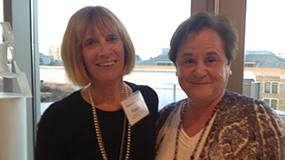 I often talk with other professionals about MI, either casually or in my trainings, and hear “Oh, I’m already doing that stuff with my patients”. I think they are confusing warmth and caring with all of MI. Certainly warmth and caring are an important part of MI, but not the whole story. When you dig a little below the surface of understanding MI, there’s much more to it.
I often talk with other professionals about MI, either casually or in my trainings, and hear “Oh, I’m already doing that stuff with my patients”. I think they are confusing warmth and caring with all of MI. Certainly warmth and caring are an important part of MI, but not the whole story. When you dig a little below the surface of understanding MI, there’s much more to it.
So, what constitutes being trained in MI or possessing MI skills? Perhaps you have read about MI in an article or text, or attended a lecture at a conference. These are very good places to start, but certainly does not make you proficient. You might have the general idea of how MI works, and even understand the basic skills and techniques, but operationalizing them is another matter entirely.
Am I trying to discourage you? Not at all! Your next steps might be to attend a hands-on workshop, and a full day training (or more) is best. If your resources, time and money, don’t allow for that, a half-day is better than nothing. The workshop should include some lecture, some viewing of video tapes, and lots of chance to practice in small groups and pairs. I find that people learn MI best when they apply the ideas to themselves, so much of your practice should include “role playing” yourself, and not a patient. The research literature on how people learn MI indicates that it takes three full days of training (or equivalent in individual coaching and supervision) for practitioners to achieve minimum competence in MI.
There’s also research on how people retain what they’ve learned in workshops. For most of us, we attend a workshop, then return to our clinical or teaching settings where the organization isn’t focused in this way. Most institutions still operate on the traditional medical model of “just tell them what to do”. It’s really hard to maintain your MI spirit and technique when the pressures of everyday work pull you away.
We’ve learned that the best way to reinforce learning after a workshop is by having coaching and supervision in MI. This can be done one-to-one, or in small groups, in person or by phone or Skype. It can also be in a short workshop setting of perhaps 2 hours or even a lunchtime supervision meeting. I offer tailored coaching and supervision programs, and would be very pleased to discuss them with you. You will find more information on my webisite about my training programs.
 If you would like to know more about Motivational Interviewing, check out my book, Wellness, Not Weight: Health at Every Size and Motivational Interviewing, brings a new, well rounded perspective to issues of weight, health and helping people change behavior. This book is the first to address Health at Every Size (HAES), Motivational Interviewing (MI), and a non-diet, wellness approach to managing health and weight within one comprehensive text. Read more here .
If you would like to know more about Motivational Interviewing, check out my book, Wellness, Not Weight: Health at Every Size and Motivational Interviewing, brings a new, well rounded perspective to issues of weight, health and helping people change behavior. This book is the first to address Health at Every Size (HAES), Motivational Interviewing (MI), and a non-diet, wellness approach to managing health and weight within one comprehensive text. Read more here .



